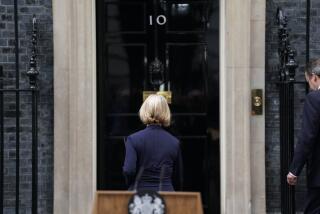Major Loses His Gulf Glow : A burst of popularity fueled by the war has faded, forcing Britain’s prime minister to rethink plans for calling an early election.
- Share via
LONDON — Prime Minister John Major has found that the luster of leading Britain during the successful Persian Gulf War has faded surprisingly quickly. As a result, he will probably delay a new national election until next fall.
Despite Britain’s strong role in the Gulf War, second only to that of the United States, Major’s Conservative Party has been sinking in public opinion polls recently, falling behind the opposition Labor Party. Unlike former Prime Minister Margaret Thatcher, who presided over the victorious Falkland Islands War in 1982, the “Gulf factor” seems to have been short-lived for Major.
Further, dissension in Tory party ranks has led to charges that Major has “dithered” on domestic issues. Thus, like President Bush, Major must disabuse the British public of criticism from Labor--and from some die-hard Thatcher supporters--that he is a “wimp,” uncertain in his leadership.
Not long ago, Major, Thatcher’s 47-year-old successor, was scoring higher in opinion polls than any other prime minister since Winston Churchill. Major is still personally popular, polls show, but respondents suggest their party preferences have recently shifted to Labor.
Major also has been the target of sniping from within his own party, mainly by Thatcherites, who argue he is moving away from her anti-Europe, anti-welfare line.
A few weeks ago, many political observers were speculating that Major--riding high after the Gulf victory--would call elections in June, more than a year earlier than necessary under British rules. But the mood has changed, and a senior Major aide admitted this week that there was a big difference between Thatcher’s “Falklands factor,” which carried her to victory in 1983 voting, and Major’s “Gulf factor.”
“In the Falklands, Thatcher was leading the British into battle all alone against the advice of some allies, including the U.S., and leaders of the Labor Party,” he said. “But in the Gulf, we were merely part of a generally supported, overall effort led by the U.S.”
What has diminished the Conservative Party’s standing, by all accounts, was a fiercely unpopular local poll tax. It would have replaced property taxes in supporting community budgets. While property taxes hit only property owners, the poll tax would have affected all adults--owners and tenants. Major and his government have junked the tax.
The date of the general election, Major’s advisers say, will hinge on results of a May 2 nationwide balloting for local offices.
More to Read
Sign up for Essential California
The most important California stories and recommendations in your inbox every morning.
You may occasionally receive promotional content from the Los Angeles Times.











